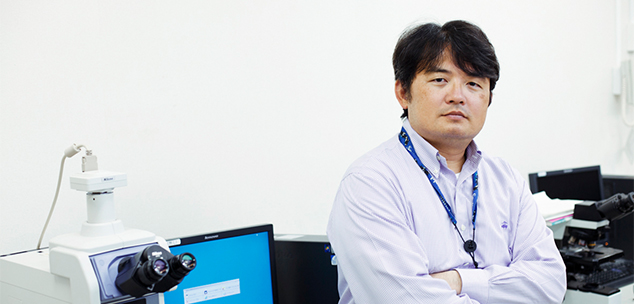Home > Organization > Division of Pathology(Kashiwa) > Members > Satoshi Fujii, MD, PhD
Satoshi Fujii, MD, PhD

It is possible that molecular biological analysis could uncover the molecular basis of pathologically-determined morphology. Conversely, research in the field of pathology may enable elucidation of the molecular mechanism of that morphology. I propose performing research that aims to fuse molecular biology and pathology perspectives. My two major research projects are to elucidate purposeful transformation of cancer cells through histone adaptation and to put pathological perspective to practical use in the clinical field.
Official title
- Head, Division of Pathology.
- Associate professor, Cooperative Graduate School of Medical and Dental Sciences, Tokyo Medical and Dental University
Area of research
- Human Pathology
- Experimental Pathology
Keywords
- Histone
- Squamous cell carcinoma
- Autophagy
- Epigenetics
- Head and neck cancer
- Breast cancer
- Esophageal cancer
- Digestive organ cancer
- Radiation disorder
Current major research theme
- Histone adaptation of cancer cells
- Research aimed at establishing new diagnostic and therapeutic modalities
Collaborative research themes
- Cancer epigenetics
- Research from a pathological perspective in the clinical field
sfujii●east.ncc.go.jp(● replace to @)
Brief history
- 1994 Graduation from Hiroshima University School of Medicine
- 1998 Graduate School of Medicine Hiroshima University, Doctor of Medicine
- 1998 Medical staff, Department of Diagnostic Pathology, National Hospital Organization, Kure Medical Center and Chugoku Cancer Center, Kure, Japan.
- 1999 Research associate, Second Department of Pathology, Hiroshima University School of Medicine
- 2001 Postdoctoral Fellow, MD Anderson Cancer Center, University of Texas
- 2004 Research associate, Department of Pathology, Hiroshima University Institute of Biomedical and Health Sciences, Hiroshima University / Medical staff, Department of Diagnostic Pathology, Hiroshima Red Cross Hospital & Atomic-bomb Survivors Hospital
- 2005 Head, Pathology division, Research Center for Innovative Oncology, National Cancer Center at Kashiwa
- 2012 Current position
Major affiliated society
- Japanese Cancer Association (Councilor)
- Japanese Pathological Society (Academic councilor)
- Japan Society for Head and Neck Cancer (Chairperson of pathology committee、Member of superficial cancer committee)
- Japan Esophageal Society (Member of endoscopic investigation committee)
- Japanese Breast Cancer Society
- Japanese Society for Gastroenterological Carcinogenesis
- Japanese Society of Clinical Cytology (Instruct)
Major publications
- Fujii S, Yamashita S, Yamaguchi T, Takahashi M, Hozumi Y, Ushijima T, Mukai H. Pathological complete response of HER2-positive breast cancer to trastuzumab and chemotherapy can be predicted by HSD17B4 methylation. Oncotarget. 8:19039-19048, 2017
- Mitani S, Tomioka T, Hayashi R, Ugumori T, Hato N, Fujii S. Anatomic Invasive Depth Predicts Delayed Cervical Lymph Node Metastasis of Tongue Squamous Cell Carcinoma. Am J Surg Pathol. 40:934-42, 2016.
- Fujii S, Fukamachi K, Tsuda H, Ito K, Ito Y, Ochiai A. RAS oncogenic signal upregulates EZH2 in pancreatic cancer. Biochem Biophys Res Commun, 417:1074-1079, 2012
- Fujii S, Tokita K, Wada N, Ito K, Yamauchi C, Ito Y, Ochiai A. MEK-ERK pathway regulates EZH2 overexpression in association with aggressive breast cancer subtypes. Oncogene, 30:4118-4128, 2011
- Fujii S, Yamazaki M, Muto M, Ochiai A. Microvascular irregularities are associated with composition of squamous epithelial lesions and correlate with subepithelial invasion of superficial-type pharyngeal squamous cell carcinoma. Histopathology, 56:510-522, 2010
- Fujii S, Mitsunaga S, Yamazaki M, Hasebe T, Ishii G, Kojima M, Kinoshita T, Ueno T, Esumi H, Ochiai A. Autophagy is activated in pancreatic cancer cells and correlates with poor patient outcome. Cancer Sci, 99:1813-1819, 2008
- Fujii S, Ito K, Ito Y, Ochiai A. Enhancer of zeste homologue 2 (EZH2) down-regulates RUNX3 by increasing histone H3 methylation. J Biol Chem, 283:17324-17332, 2008
- Fujii S, Ochiai A. Enhancer of zeste homolog 2 downregulates E-cadherin by mediating histone H3 methylation in gastric cancer cells. Cancer Sci, 99:738-746, 2008
- Fujii S, Luo RZ, Yuan J, Kadota M, Oshimura M, Dent SR, Kondo Y, Issa JP, Bast RC Jr, Yu Y. Reactivation of the silenced and imprinted alleles of ARHI is associated with increased histone H3 acetylation and decreased histone H3 lysine 9 methylation. Hum Mol Genet, 12:1791-1800, 2003
Other
- Prize for scientific study (A speech) (The 56th Autumn Annual Meeting of the Japanese Society of Pathology, 2010)
- Certificated pathologist
- Certificated cytologist
- Responsible organs for pathological diagnosis in National Cancer Hospital East : Head and neck, Breast, Digestive tract (esophagus), Bone and Soft tissue, Gynecological organ, Skin
- Instruction chief in education training facilities (Japanese Society of Clinical Cytology), National Cancer Hospital East
- Chief pathologist of GI-SCREEN SCRUM Japan

